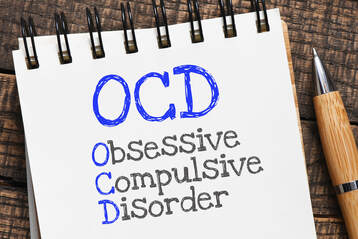Thinking Errors in Obsessive Compulsive DisorderWritten by: Kat Harris, PhD, LCPThinking errors, also known as cognitive distortions, are basically thinking patterns that can be problematic in that they are often inaccurate, unhelpful, and can be harmful to someone’s mental health. Individuals with Obsessive Compulsive Disorder tend to engage in specific types of thinking errors that we try to target in treatment.
Intolerance of Uncertainty This thinking error is thought to be a hallmark of OCD. Individuals with OCD often feel that they MUST have 100% certainty, that they must eradicate all doubt, and that 100% certainty is possible as long as they figure out a way to achieve that certainty (e.g., checking over and over again, obtaining reassurance from others, body scanning, etc.). Any possible doubt that their fear could be true is considered intolerable and unacceptable. Significance of Thoughts Individuals with OCD give their thoughts a lot of meaning and importance. In fact, this is one of the main ways which OCD “hooks” them into a trap. For example, an individual with OCD may have an intrusive image of pushing someone into the street. While this thought could very well also happen to someone without OCD (in fact, we know that the kinds of thoughts that individuals with OCD have do not differ from individuals without OCD), an individual with OCD might interpret this thought to mean something about themselves, such as that having the thought means they are more likely to actually push someone and harm them (also known as Likelihood Thought-Action Fusion), or that they are a “bad” person for having the thought (also known as Moral Thought-Action Fusion). Whereas an individual without OCD might interpret the meaning of the thought to be senseless, meaningless, and not reflective of themselves or their intentions…that the thought was just a mental “blip” (and they are also comfortable with not having to “prove” or be 100% certain of this). The “Significance of Thoughts” thinking error is often seen in individuals with “Harm Obsessions” (e.g., accidentally harming someone, losing control, acting on an impulse) and/or “Unacceptable Thought Obsessions” (e.g., obsessions related to sex or violence - seen as unacceptable by the person with OCD). Another related thinking error is the belief that it is very important and possible to control thoughts (Need to Control Thoughts). The Big 3 The Big 3 Thinking Errors tend to be common across all anxiety disorders and OCD: Overestimation of Cost: Individuals with OCD tend to overestimate the severity of their feared outcomes Overestimation of Likelihood: Individuals with OCD tend to overestimate the likelihood of bad things happening Underestimation of Self-Efficacy: Individuals with OCD tend to under-estimate their ability to handle feared outcomes Overestimation of Responsibility Individuals with OCD tend to take on a LOT of responsibility for their thoughts and behaviors. They believe that they must prevent bad things from happening to themselves or others (usually specific to the content of their obsessions), that they have the power to do so, and/or that they won’t be able to tolerate knowing they could have prevented something bad happening if something bad did happen. Perfectionism and the “Just Right” Error Individuals with OCD may feel that things must be perfect, “just right,” or symmetrical/evened-out in order to feel less distressed and/or in order to prevent bad things from happening (e.g., Magical Thinking). Often times, intolerance of anxiety or the fear that anxiety will be perpetual are related to this kind of thinking error (e.g., “If I don’t make this even, I will feel anxious forever”). Exposure and Response Prevention (ERP) is a treatment approach that attempts to alter these thinking patterns/errors via beahvioral learning principles and the development of safety associations. To learn more about ERP you can use these links: Exposure and Response Prevention - OakHeart, Center for Counseling Exposure and Response Prevention - International OCD Foundation What to Expect in CBT Treatment Series: OCD - Dr. Hillary Gorin, OakHeart, Center for Counseling Comments are closed.
|
OakHeart
|
- Home
- Counseling
-
Specialties
- Depression
- Bipolar Disorder
- Anxiety Disorders >
- Obsessive-Compulsive Disorder (OCD)
- Eating Disorders
- Grief and Bereavement
- ADHD
- Maternal Mental Health
- Infertility, Miscarriage, and Neonatal Loss
- Domestic Violence and Sexual Assault
- Posttraumatic Stress Disorder (PTSD) >
- Trauma
- Non-Suicidal Self-Injury (NSSI)
- Substance Use Disorders (SUD)
- Anger Management
- Insomnia
- Divorce Recovery
- Relationship Concerns and Couples Counseling
- Self-Esteem
- Therapy for Therapists
- LGBTQA+ Support
- Faith-Based Counseling
-
Providers
- Erin Mitchell
- Pamela Heilman
- Katie Sheehan
- Hillary Gorin
- Lee Ann Heathcoat
- Adam Ginsburg
- Megan Noren
- Sarah Williams
- Christina Bieche
- Bridgette Koukos
- Laura Lahay
- Kate Nash
- Anna Perkowski
- Alma Lazaro
- Leah Arthur
- Marissa Vogrin
- Erin Blair
- Amy Jakobsen
- Lizzy Lowe
- Tony Fasano
- Gerry Lawm
- Vanessa Osmer
- Kat Harris
- Locations
- Contact
- Treatments
- Employment
- FAQ and Notices
- OakHeart Blog
- Administrative and Leadership Team
- Mental Health Resources
- Divorce Mediation
- Professional Consultation
|
|




